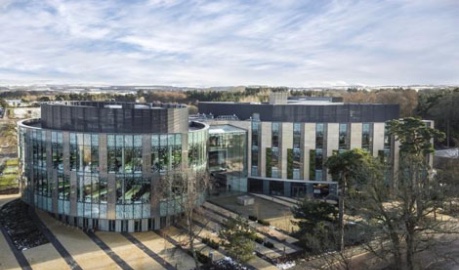Thursday 2nd August 2018, 11:00am
John Mackenzie, CEO of Roslin Innovation Centre describes in The Herald how scientists in Scotland are leading the way to reduce disease in livestock and improve animal health.
A lot has changed at The Roslin Institute in the last 20 years. From the days of ‘Dolly’ the sheep until now, a ‘Silicon Valley’ of animal health is emerging on the University of Edinburgh’s Easter Bush Campus.

Opened in August 2017, the Roslin Innovation Centre is a new business gateway to help accelerate the commercialisation of research happening within and around Europe’s largest concentration of animal health researchers and scientists at The Roslin Institute and the Royal (Dick) School of Veterinary Studies.
The Roslin Innovation Centre facilitates access for this research work to be translated into something of value to society.
It is this rare combination of animal health discovery research adjacent to commercial innovation that is providing the Campus with the infrastructure to allow the cross fertilisation of ideas and scientific breakthrough here in Scotland. Traditionally, The Roslin Institute has its roots in scientific discovery but by working together with commercial partners it is making scientific research and discovery commercially viable.
The research taking place at Roslin is focused on enhancing and improving animal production, health and welfare. Scientists are finding solutions to enhance the sustainability of livestock farming in rural communities and increase the productivity of agriculture. This doesn’t just make life easier for the farmers but improves the welfare of the animals. By reducing sickness, understanding animal behaviour and understanding what makes them happy, scientists can markedly improve animal welfare and enrich the environment.
Roslin is one of only a handful of sites in the world with the capacity for genome editing in livestock and for running animal trials. Not to be confused with genetic modification, genome editing doesn’t introduce any foreign DNA into the animal.
The Institute recently announced it had made pigs that are completely immune to Porcine Reproductive and Respiratory Syndrome Virus (PRRSV), one of the major infectious diseases of the pig industry. In a separate trial, Roslin is testing pigs designed to be resistant to African Swine Fever, a highly infectious disease that has recently swept across the Baltic countries and into Poland. This work on genome editing helps reduce infectious diseases among pigs, thereby improving their welfare, and results in less wastage for farmers and enables more pigs to go to market -which is an economic and environmental benefit.
What is another by-product of all this research? Data. Scientists can analyse every aspect of the animal-environment interaction through the aid of microchips that constantly send data from the animals back to the lab using the “Internet of Things”. These data sent are giving scientists more detailed information than ever before on the health, growth and behaviours of farm animals.
To implement the use of routine monitoring data more widely, the University of Edinburgh is leading a programme on ‘Data Driven Innovation’ as part of Edinburgh’s City Region Deal. This is a merging of data science and scientific research using high-speed analytics, giving scientists the ability to capture flows of data and understand what it is telling them. Big data projects like this are going to dominate all aspects of scientific research in the next decade.
The research and animal trials taking place at Roslin are enabling scientists to produce livestock animals with greater resilience to devastating diseases. All this scientific research will not happen overnight, more has to be done and there are scientific breakthroughs still to be made. Yet, with this perfect mix of academia and industry, the Easter Bush Campus is an exemplar environment for innovation in Scotland. It is an international asset in animal health and veterinary science, working to ensure that the growing world population has access to safe food and healthy animals.